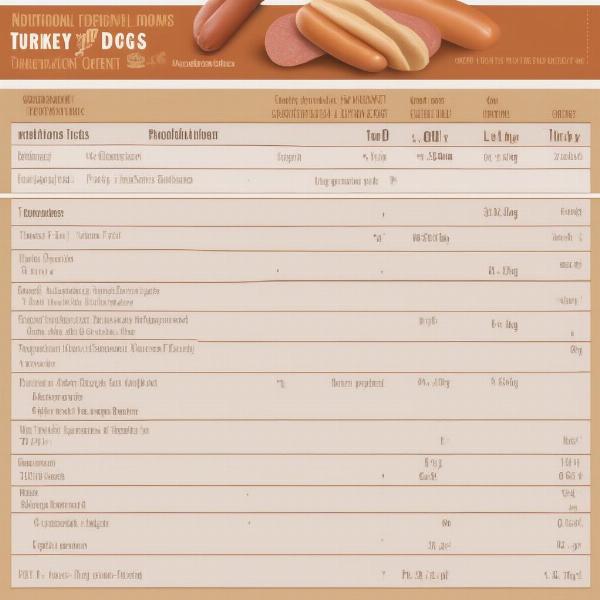Organic turkey hot dogs are gaining popularity as a potential treat for dogs. But are they truly a healthy and safe option? This article will delve into the nutritional value, potential risks, and best practices for feeding your furry friend organic turkey hot dogs.
Many dog owners are seeking healthier alternatives to traditional, processed treats. The appeal of “organic” often signifies a more natural and wholesome product. While organic turkey hot dogs may seem like a good choice, it’s crucial to understand the nuances of their ingredients and potential impact on your dog’s health. Are they a nutritious snack or just a tasty indulgence? Let’s find out.
Understanding Organic Turkey Hot Dogs
What exactly does “organic” mean in the context of turkey hot dogs? Generally, it indicates that the turkeys were raised without antibiotics or hormones, and fed organic feed. However, this doesn’t necessarily guarantee a completely healthy product for your dog. Many organic turkey hot dogs still contain added salt, preservatives, and other ingredients that might not be ideal for canine consumption. pack hot dog san fernando paquete 660g It’s crucial to carefully examine the ingredient list.
Nutritional Value of Organic Turkey Hot Dogs
Turkey itself is a good source of protein and some essential nutrients. However, the processing involved in making hot dogs, even organic ones, can diminish these benefits. The high sodium content is a primary concern, as excessive salt can be harmful to dogs, especially those with pre-existing health conditions.
Potential Risks of Feeding Organic Turkey Hot Dogs
While organic turkey hot dogs might seem like a healthier alternative, they are not without potential risks.
- High Sodium Content: As mentioned earlier, the high sodium content can lead to various health issues in dogs, including dehydration, increased thirst, and even sodium ion toxicosis in severe cases.
- Additives and Preservatives: Even organic varieties can contain additives and preservatives to enhance flavor and shelf life. Some of these ingredients may be harmful to dogs.
- Choking Hazard: Hot dogs, especially when served whole, can pose a choking hazard, particularly for smaller dogs. It’s always best to cut them into smaller, manageable pieces.
- how to dehydrate chicken for dog treats Consider healthier treat alternatives like dehydrated chicken.
Safe Practices for Feeding Your Dog Organic Turkey Hot Dogs
If you choose to give your dog organic turkey hot dogs as an occasional treat, follow these guidelines:
- Moderation is Key: Offer them sparingly. Treats, including organic turkey hot dogs, should not make up more than 10% of your dog’s daily caloric intake.
- Choose Low-Sodium Varieties: Look for brands with the lowest possible sodium content.
- Cut into Small Pieces: Always slice hot dogs into small, bite-sized pieces to prevent choking.
- Supervise Your Dog: Never leave your dog unattended while eating hot dogs.
- Consult Your Veterinarian: Discuss with your vet before introducing new foods into your dog’s diet, especially if they have any health concerns.
Are Organic Turkey Hot Dogs Right for My Dog?
The decision of whether or not to feed your dog organic turkey hot dogs is ultimately yours. While they can be an occasional treat, it’s important to be mindful of the potential risks and prioritize a balanced, nutritious diet for your furry friend.
 Comparing Dog Treats
Comparing Dog Treats
Dr. Emily Carter, DVM, a renowned veterinary nutritionist, advises, “While organic turkey hot dogs might seem appealing, remember that even small amounts of processed foods can contribute to long-term health issues in dogs. Prioritize whole, unprocessed foods whenever possible.”
Another expert, Dr. David Miller, a canine behaviorist, adds, “Treats should be used strategically for training and positive reinforcement. Over-reliance on treats, even healthy ones, can lead to undesirable behaviors.”
Conclusion
Organic turkey hot dogs can be an occasional treat for your dog if given in moderation and with careful consideration of their nutritional content. However, they are not a necessary part of a healthy canine diet. Prioritizing whole, unprocessed foods and consulting with your veterinarian is always the best approach to ensuring your dog’s long-term health and well-being.
FAQ
- Are organic turkey hot dogs better than regular hot dogs for dogs? While organic options may be slightly better due to the lack of antibiotics and hormones in the turkey, both types are high in sodium and should be given sparingly.
- Can puppies eat organic turkey hot dogs? Puppies have sensitive digestive systems. It’s best to avoid giving them hot dogs altogether.
- What are some healthy alternatives to organic turkey hot dogs? Consider treats like small pieces of cooked chicken, carrots, or apples.
- How many organic turkey hot dogs can I give my dog per day? Treats should not exceed 10% of your dog’s daily caloric intake. A small piece of hot dog is usually sufficient.
- What should I do if my dog eats a whole organic turkey hot dog? Monitor your dog closely. If they show any signs of distress, contact your veterinarian immediately.
- Are there any specific brands of organic turkey hot dogs recommended for dogs? Always consult with your vet for recommendations based on your dog’s individual needs.
- Can organic turkey hot dogs cause allergies in dogs? While turkey itself is not a common allergen, other ingredients in the hot dog could trigger an allergic reaction.
ILM Dog, an international pet website, is dedicated to providing reliable and practical information on all aspects of dog care and upbringing. We offer expert advice on dog breeds, health, training, nutrition, grooming, exercise, and much more. Whether you are a new dog owner or a seasoned enthusiast, ILM Dog is your comprehensive resource for all things canine. Contact us at [email protected] or +44 20-3965-8624. Visit us at ILM Dog for more expert guidance and tips.